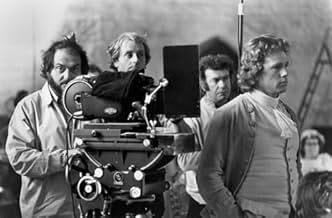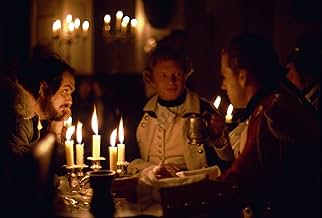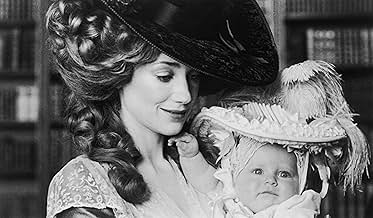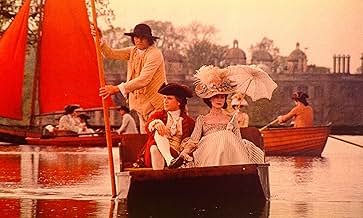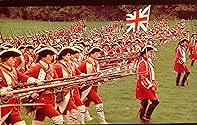Barry Lyndon
- 1975
- Tous publics
- 3h 5min
En Angleterre au dix-huitième siècle, un Irlandais malhonnête gagne le coeur d'une veuve riche et assume la position aristocratique de son mari décédé.En Angleterre au dix-huitième siècle, un Irlandais malhonnête gagne le coeur d'une veuve riche et assume la position aristocratique de son mari décédé.En Angleterre au dix-huitième siècle, un Irlandais malhonnête gagne le coeur d'une veuve riche et assume la position aristocratique de son mari décédé.
- Réalisation
- Scénario
- Casting principal
- Récompensé par 4 Oscars
- 17 victoires et 14 nominations au total
Hardy Krüger
- Capt. Potzdorf
- (as Hardy Kruger)
Diana Körner
- Lischen - German Girl
- (as Diana Koerner)
André Morell
- Lord Gustavus Adolphus Wendover
- (as Andre Morell)
Résumé
Reviewers say 'Barry Lyndon' is acclaimed for its breathtaking cinematography, intricate period details, and masterful use of natural light, often likened to fine art. It explores themes of human folly, the quest for wealth and status, and the resulting downfall. However, some criticize its slow pace, the perceived lack of emotional depth in characters, especially Ryan O'Neal's performance, and its lengthy runtime. Despite these drawbacks, many regard it as a significant artistic achievement and a standout in Kubrick's oeuvre.
Avis à la une
The beauty, the depth, and the mystery of this film are unsurpassable - what Kubrick was doing with light is just a miracle. Special lenses were designed to shoot interiors and exteriors in natural light. In one scene Barry (Ryan O'Neil) was having a dinner with a German woman who was feeding her baby and the candle light made the whole scene look like a Caravaggio's painting. This is just one of many scenes. Each of them is perfection and harmony. Costumes and sets were crafted in the era's design. Age of Enlightenment with its gallantry, wars, and duels, had been recreated in the film with the precision of the celebrated landscape and portrait masters of the period such as Thomas Gainsborough; Sir Joshua Reynolds, founder of the Royal Academy of Arts; George Romney to name just a few. If nothing else, watching BL is pure aesthetic delight - and there is one man who responsible for it, Stanley Kubrick. If ever divine film was made, "Barry Lyndon" was it and Kubrick could've quoted the Bible - "God looked at everything he had made, and he found it very good".
I've read the comments and articles that call "Barry Lyndon" cold, slow, boring, "the collection of pretty pictures', "flawed" masterpiece, and the most ridiculous one, "glittering ornament with a hollow center". I simply can't understand it. "Barry Lyndon" is the most compelling and compassionate realization of the inevitable finality of everything in this world which was presented by the visionary director with elegant sensual melancholy. Stanley Kubrick known for his detached, seemingly remote and non-sentimental style chose to reach out to his viewer directly during the epilogue, "It was in the reign of George III that the aforesaid personalities lived and quarreled, good or bad, handsome or ugly, rich or poor, they are all equal now". I don't recall any other movie that would illustrate the old wisdom, "everything will pass" in such sublime and deeply moving way.
I've read the comments and articles that call "Barry Lyndon" cold, slow, boring, "the collection of pretty pictures', "flawed" masterpiece, and the most ridiculous one, "glittering ornament with a hollow center". I simply can't understand it. "Barry Lyndon" is the most compelling and compassionate realization of the inevitable finality of everything in this world which was presented by the visionary director with elegant sensual melancholy. Stanley Kubrick known for his detached, seemingly remote and non-sentimental style chose to reach out to his viewer directly during the epilogue, "It was in the reign of George III that the aforesaid personalities lived and quarreled, good or bad, handsome or ugly, rich or poor, they are all equal now". I don't recall any other movie that would illustrate the old wisdom, "everything will pass" in such sublime and deeply moving way.
In terms of story this is on the surface at least, the simplest thing Kubrick ever made. However in terms of the technical aspect, it must have been one of his most challenging. The plot is basically about how greed, arrogance and ignorance can easily become the ruin of a man. The story itself is well told, but mostly quite simple as I said. The humor keeps us interested in the story, as does its undeniable visual beauty. It is not a stretch to say that this must be among the most beautiful looking films ever made. Every scene is filmed in all natural light, whether it be by sun or fire, and the landscapes and architecture handpicked by Kubrick himself are amazing. As in all Kubrick films, so much attention to small details equates to a great result in the end. Spielberg himself has called this film "possibly the most beautifully shot film in history.".
In terms of story, it's entertaining, in terms of it's technical achievement, the film is a landmark. Even for all the story's simplicity, there is a startling statement in the film that certainly can give the viewer real pause and thought. The finality of this world, the equality of all things in the end. It is certainly an interesting, powerful and very humbling down to earth observation. It is the kind of worldly observation that could perhaps lead some people to ruin, and yet lead others to strive for perfection. Perhaps that is part of Kubrick's thinking here, a Kubrickian challenge if you will, as he certainly was always an artist that was challenging his viewers. That through this observation people may become more aware of what they're leaving behind in this world...as one day, we will all equally be gone. For all the things written about this film, it is probably not nearly as unimportant of a story as many critics have said of it. Then again, critics and moviegoers alike have long been trying to catch up to Stanley, and never the other way around. 8.5/10.
In terms of story, it's entertaining, in terms of it's technical achievement, the film is a landmark. Even for all the story's simplicity, there is a startling statement in the film that certainly can give the viewer real pause and thought. The finality of this world, the equality of all things in the end. It is certainly an interesting, powerful and very humbling down to earth observation. It is the kind of worldly observation that could perhaps lead some people to ruin, and yet lead others to strive for perfection. Perhaps that is part of Kubrick's thinking here, a Kubrickian challenge if you will, as he certainly was always an artist that was challenging his viewers. That through this observation people may become more aware of what they're leaving behind in this world...as one day, we will all equally be gone. For all the things written about this film, it is probably not nearly as unimportant of a story as many critics have said of it. Then again, critics and moviegoers alike have long been trying to catch up to Stanley, and never the other way around. 8.5/10.
Kubrick's adaptation of Thackeray's Barry Lyndon sharply divides fans of the great director's work, as the languid pace and seemingly interminable running time -- not to mention Ryan O'Neal's questionable performance in the title role -- are cherished by some and deplored by others. Little argument will be made against John Alcott's Academy Award-winning cinematography or Ken Adam's production design, however, and Kubrickian motifs are manifest in the gallery of characters' wide-ranging displays of cowardice, guile, duplicity, avarice, jealousy, greed, and cruelty. Marisa Berenson is terribly short-changed in her role as the Lady Lyndon, but a number of other performers are given the opportunity to create a handful of memorable moments -- especially Arthur O'Sullivan (albeit briefly) as the charming, intelligent highwayman and Patrick Magee as the Chevalier. Love it or hate it, Barry Lyndon will remain essential viewing for aficionados of the director, who enjoys taking his usual shots at the more discouraging aspects of human behavior.
The genius Stanley Kubrick has truly outdone himself by crafting this masterpiece. After viewing A Space Odyssey, I thought there were no films more beautiful, but the breathtaking painting-like scenes of Barry Lyndon paired with music exquisitely chosen by Kubrick are simply stunning. There are some who may say that this film is too long or stale, but I say, that this film must be savoured slowly, and that one must enjoy it for what it is, which is almost like a series of ethereal paintings, one after another. Watch this film not for the end, but watch it and live with the fact that every scene is a part of the whole, and that the wholeness and oneness in itself is beautiful. Say, if we only watched movies for the ending, then composers who only wrote finales would be the greatest. All you must do is to simply sit down and relax, then, nothing else except absolute enchantment can possibly follow.
In the midst of the many wonderful films made by Stanley Kubrick, it is strange to note how rarely people mention "Barry Lyndon".
The film portrays an unusual young Irish man, Redmond Barry, and his endeavours as he is forced to leave his home and tries to make good his life elsewhere. His life away from home starts out as a career in the British Army; only to evolve in surprising ways and lead to as different places as a position of trust within the Prussian Army and later a title of nobility, gained by what our time can only measure as rather disgraceful means.
Some consider Barry Lyndon a slow and tedious film and it is in deed past three hours in length, but this is because of the artistic flow of a film that strays not only to tell a tale about a man who is by no means neither hero nor villain, but also a film which is in no hurry and takes the time for every detail to sink into the mind and heart of the viewer. Some of the scenic images in "Barry Lyndon" are in themselves pieces of art, rendered with a passion for the landscapes and the man-made structures within them.
The myth that all scenes were recorded using no artificial lighting no doubt stems from the very realistic lights during indoor takes, and some of them truly did not feature artificial light. This is but one of the many details that so easily conveys a sense of a realistic portray of the era; the 18th century and the time after the seven-year war in the later half of the century. The impressive atmosphere and the wonderfully picturesque scenarios along with the fact that the entire plot moves at a calm pace makes this film a very pleasant experience.
"Barry Lyndon is", amidst Kubricks' many masterpieces, a film so easily dismissed due to length and the fact that it is overshadowed by others, but I deeply recommend this film to anyone who would like to see a film both for the plot line, the story and the pure enjoyment of the images presented. Stanley Kubrick made many great films and this one is most definitely one of them! KimotoCat
The film portrays an unusual young Irish man, Redmond Barry, and his endeavours as he is forced to leave his home and tries to make good his life elsewhere. His life away from home starts out as a career in the British Army; only to evolve in surprising ways and lead to as different places as a position of trust within the Prussian Army and later a title of nobility, gained by what our time can only measure as rather disgraceful means.
Some consider Barry Lyndon a slow and tedious film and it is in deed past three hours in length, but this is because of the artistic flow of a film that strays not only to tell a tale about a man who is by no means neither hero nor villain, but also a film which is in no hurry and takes the time for every detail to sink into the mind and heart of the viewer. Some of the scenic images in "Barry Lyndon" are in themselves pieces of art, rendered with a passion for the landscapes and the man-made structures within them.
The myth that all scenes were recorded using no artificial lighting no doubt stems from the very realistic lights during indoor takes, and some of them truly did not feature artificial light. This is but one of the many details that so easily conveys a sense of a realistic portray of the era; the 18th century and the time after the seven-year war in the later half of the century. The impressive atmosphere and the wonderfully picturesque scenarios along with the fact that the entire plot moves at a calm pace makes this film a very pleasant experience.
"Barry Lyndon is", amidst Kubricks' many masterpieces, a film so easily dismissed due to length and the fact that it is overshadowed by others, but I deeply recommend this film to anyone who would like to see a film both for the plot line, the story and the pure enjoyment of the images presented. Stanley Kubrick made many great films and this one is most definitely one of them! KimotoCat
Le saviez-vous
- AnecdotesProduction was moved from Ireland to England after writer, producer, and director Stanley Kubrick received word that his name was on an I.R.A. hit list for directing a movie featuring English soldiers in Ireland. Consequently, several scenes were dropped.
- GaffesThe narrator states, early on, "About this time, the United Kingdom was in a state of great excitement". The United Kingdom came into being in 1801, when it merged with the Kingdom of Ireland, before which it was known merely as the Kingdom of Great Britain. In fact the Act of Union of 1707, which joined England and Scotland, refers to "the United Kingdom of Great Britain" or "the United Kingdom" throughout the text. "United Kingdom" was in common use at the time of the film.
- Citations
Title card: [End title card] EPILOGUE
Title card: It was in the reign of George III that the aforesaid personages lived and quarreled; good or bad, handsome or ugly, rich or poor they are all equal now
- Versions alternativesThe 2011 Blu-ray plastered the opening Saul Bass variant of the Warner Bros. Pictures logo with the black and white WB shield.
- ConnexionsEdited into Hai-Kubrick (1999)
- Bandes originalesPiano Trio in E-flat, Op 100 (second movement)
Composed by Franz Schubert
piano: Anthony Goldstone
cello: Moray Welsh
violin: Ralph Holmes
Meilleurs choix
Connectez-vous pour évaluer et suivre la liste de favoris afin de recevoir des recommandations personnalisées
Détails
- Date de sortie
- Pays d’origine
- Langues
- Aussi connu sous le nom de
- Баррі Ліндон
- Lieux de tournage
- Sociétés de production
- Voir plus de crédits d'entreprise sur IMDbPro
Box-office
- Budget
- 11 000 000 $US (estimé)
- Montant brut mondial
- 283 918 $US
- Durée3 heures 5 minutes
- Couleur
- Mixage
- Rapport de forme
- 1.66 : 1
Contribuer à cette page
Suggérer une modification ou ajouter du contenu manquant





